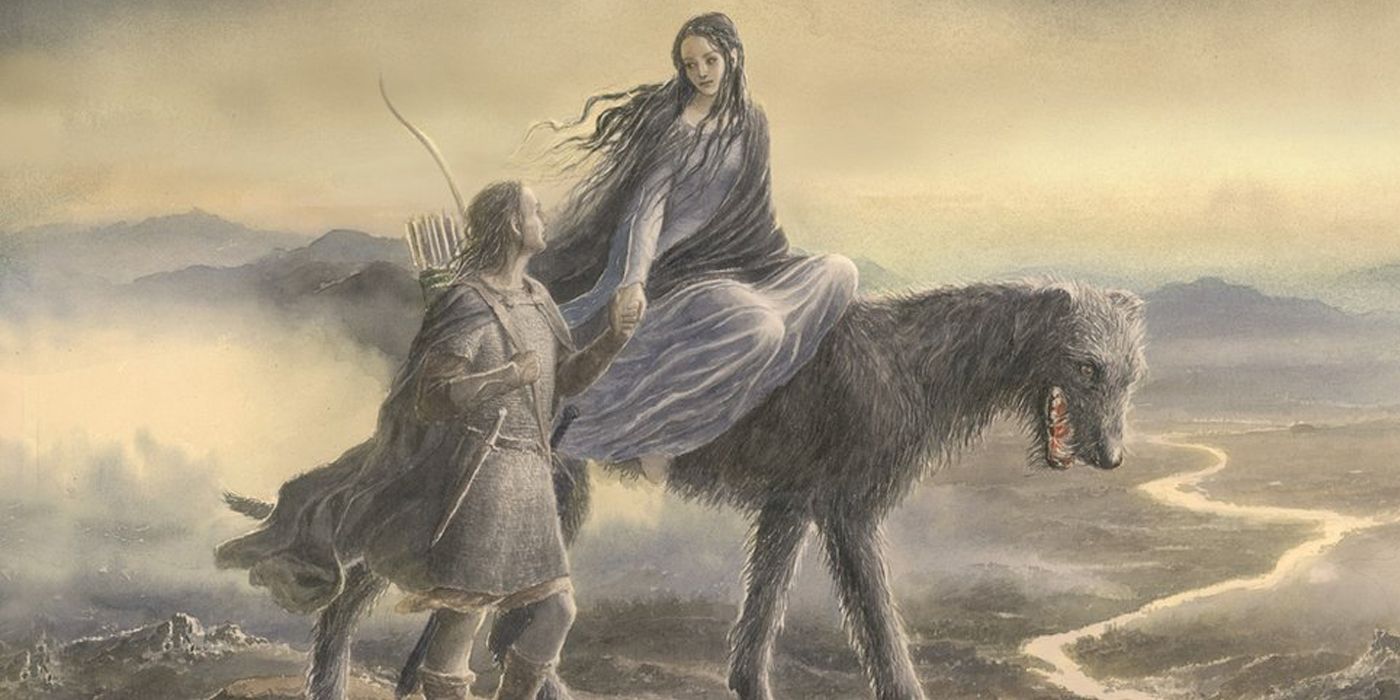
Círdan the Shipwright, the future Lord of the Grey Havens, has been one of the most popular additions to the second season of Prime Video’s The Lord of the Rings: The Rings of Power. Actor Ben Daniels portrayed Círdan with an air of wisdom and serenity that contrasted the brash and ambitious personalities of the series’ younger Elves. Unsurprisingly, Elrond turned to someone as sage as Círdan for advice about what to do with the Elven Rings of Power. Círdan originally planned to destroy the Rings by dropping them into an underwater chasm, but after a wave hit his boat and prevented him from doing so, he changed his mind. He claimed Narya, the Ring of Fire, for himself, and he brought the other two back to Lindon, where Galadriel and High King Gil-galad claimed them. In the episode “Where the Stars are Strange,” Elrond and Círdan discussed this choice.
Elrond thought that the Rings of Power must be evil since Sauron devised them, but Círdan advised him to separate the art from the artist. He questioned, “Would you cast Rúmil’s verses into the flame because the poet was a drunkard?” Elrond expressed surprise that Rúmil was a drunkard, to which Círdan added, “Do not ask of Daeron. Insufferable. But a voice… that could make the very sun weep tears of fire.” Neither of these names was invented for the series; Rúmil and Daeron are both obscure characters from J. R. R. Tolkien’s writings. They were Elven loremasters, a term for those who studied ancient history, language, and literature. Tolkien mentioned both of them in passing in the novel version of The Lord of the Rings, discussing their contributions to the alphabets of Middle-earth, but he wrote nothing about their personal lives. However, in The Silmarillion, which described the history of Middle-earth, he elaborated upon the stories of both characters.
Daeron’s Creations Were Popular Among Both Elves and Dwarves

Daeron was a Sindar Elf who lived in Doriath, an Elven kingdom from the First Age of Middle-earth. In the index of The Silmarillion, Tolkien described him as the “minstrel and chief loremaster of King Thingol.” Daeron’s first notable act was the creation of an alphabet: Cirth. Previously, Sindarin was only a spoken language, but Cirth allowed the Elves of Doriath to put Sindarin into writing. Cirth was made up of angular runes that were ideal for carving into hard surfaces like wood, stone, and metal. This system of writing spread throughout Middle-earth, and not only the Elves adopted it. The Dwarves of Belegost, who were in Doriath at the time to help build the underground city of Menegroth, introduced Cirth to the rest of their kind. For reasons that will be discussed later, Cirth eventually fell out of favor among Elves, but Dwarves continued using it even during the events of The Hobbit and The Lord of the Rings. Some examples of Cirth from Peter Jackson’s film adaptations included the Book of Mazarbul that Gandalf read in the Mines of Moria, the runes on Aragorn’s sword Anduril, Thrór’s map of Erebor, and the tattoos on Dwalin’s hands.
Actor Name
Ben Daniels
Birthplace
Nuneaton, Warwickshire, England
Birthdate
June 10, 1964
First Film Acting Role
Wish You Were Here (1987)
Awards Won
Laurence Olivier Award for Best Actor in a Supporting Role (2001), WhatsOnStage Award for Best Supporting Actor in a Play (2001), Theatre World Award (2008), Screen Actors Guild Award for Outstanding Performance by an Ensemble in a Drama Series (2020), Critics’ Circle Theatre Award for Best Actor (2022)
The invention of Cirth was not the main thing that made Daeron famous, for he was widely regarded as the most skillful Elven musician in Middle-earth. According to the section “Of Beren and Lúthien” from The Silmarillion, Daeron “became the greatest of all the minstrels of the Elves east of the Sea, named even before Maglor son of Fëanor.” Based on this quote, the only Elves who surpassed him were those who lived in the Undying Lands, west of the Belegaer, or Great Sea. This explained why Círdan thought that Daeron’s music was beautiful enough to make the sun cry, but not why he found him so “insufferable.” Though Tolkien never used that term about Daeron, some characters from The Silmarillion certainly would have deemed it an apt description.
Tolkien Left Daeron’s Fate a Mystery

Daeron’s name came from the Sindarin word daer, meaning “large” or “great.”
Maglor, the second-best musician in Middle-earth, was Elrond’s foster father.
Daeron was in love with Lúthien, the princess of Doriath, but she did not reciprocate his feelings. They remained friends, but as Tolkien wrote in the index, he “twice betrayed her.” Both of these betrayals occurred in the year 465 of the First Age. Lúthien fell in love with a mortal Man named Beren, and she began meeting with him in secret since she knew that her father would not approve of such a romance. When Daeron learned of this, he grew jealous, so he told Thingol about his daughter’s relationship. This prompted Thingol to send Beren on the seemingly impossible task of stealing a Silmaril from the Dark Lord Morgoth.
Soon after Beren departed on his mission, Sauron captured and imprisoned him. Lúthien, unaware that Daeron had previously broken her trust, confided in him that she planned to sneak out of Doriath and rescue Beren. Once again, he told Thingol about her plans, either out of jealousy, a desire to keep her from doing something so dangerous, or most likely, a combination of both. Thingol tried to keep Lúthien locked in a remote tree house, but she used her Elven magic to escape. Daeron went searching for her, but he was unable to find her, and he believed that she had died in her attempt to save Beren. Too heartbroken to return to Doriath, Daeron began wandering Middle-earth. In “Of Beren and Lúthien,” Tolkien wrote, “Passing over the mountains he came into the East of Middle-earth, where for many ages he made lament beside dark waters for Lúthien, daughter of Thingol, most beautiful of all living things.” This was the last thing Tolkien wrote about Daeron, and he was presumably never seen again, even after Beren and Lúthien returned to Doriath in the year 466.
Rúmil Put Middle-earth’s Mythology Into Writing

Tolkien imagined that The Lord of the Rings and the rest of the stories in his legendarium were actually translations of a text from Middle-earth called the Red Book of Westmarch. Bilbo and Frodo wrote their accounts in the Red Book, which served as the basis for The Hobbit and The Lord of the Rings. Bilbo also included many older Elven texts in the Red Book, which served as the basis for The Silmarillion. One of these texts, namely “Ainulindalë,” was canonically written by Rúmil. It described the ancient origins of the universe, in which divine spirits sang the world into existence. The nods to Rúmil and Daeron in The Rings of Power were more than obscure Easter eggs for fans of Tolkien’s novels. They highlighted Círdan’s extreme age, as he personally knew historical figures about whom Elrond had only read. They also connected the series to Tolkien’s wider body of work and helped immerse the audience by making Middle-earth feel like a real place with its ancient lore.





